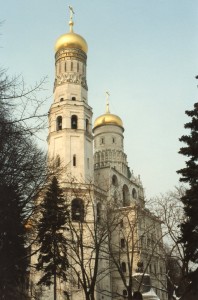Here’s a thought-provoking take on, if you like, “Vladimir Putin, conservative”, from John Schindler. The piece covers too much ground to be summarized in a few excerpts, so I’ll focus on just one aspect of it, the way that Putin is looking to base the legitimacy of his regime on older, far older, notions of what the Russian state should be:
[T]he reconquest of Crimea has caused a clear change of tone in Moscow, with celebration of old fashioned Russian nationalism coming into fashion. In his speech to the Duma announcing the triumphant annexation of Crimea, when speaking of Russians, Putin specifically used the ethnic term – russkiy – not the more inclusive rossiyskiy, which applies to all citizens of the Russian Federation. This came among incantations to the full Great Russian program, with a Moscow-centric view of Eastern Europe seemingly endorsed by mentions of great Orthodox saints. Unstated yet clearly, this was all of a piece with “Third Rome” ideology, a powerful admixture of Orthodoxy, ethnic mysticism, and Slavophile tendencies that has deep resonance in Russian history.
Westerners seemed shocked by this “Holy Russia” stuff, but Putin has been dropping unsubtle hints for years that his state ideology includes a good amount of this back-to-the-future thinking, cloaked in piety and nationalism. Western “experts” continue to state that a major influence here is Aleksandr Dugin, an eccentric philosopher who espouses “Eurasianism,” an odd blend of geopolitical theory and neo-fascism. While Dugin is not irrelevant, his star at the Kremlin actually faded a decade ago, though he gets some Kremlin attention because his father was a GRU general. Far more important to divining Putin’s worldview, however, is Ivan Ilyin, a Russian political and religious thinker who fled the Bolsheviks and died an emigre in Switzerland in 1953. In exile, Ilyin espoused ethnic-religious neo-traditionalism, amidst much talk about a unique “Russian soul.” Germanely, he believed that Russia would recover from the Bolshevik nightmare and rediscover itself, first spiritually then politically, thereby saving the world. Putin’s admiration for Ilyin is unconcealed: he has mentioned him in several major speeches and he had his body repatriated and buried at the famous Donskoy monastery with fanfare in 2005; Putin personally paid for a new headstone. Yet despite the fact that even Kremlin outlets note the importance of Ilyin to Putin’s worldview, not many Westerners have noticed.
They should, however, because Putinism includes a good amount of Ilyin-inspired Orthodoxy and Russian nationalism working hand-in-glove, what its advocates term symphonia, meaning the Byzantine-style unity of state and church, in stark contrast to American notions of separation of church and state. Although the Russian Orthodox Church… is not the state church, de jure, in practice it functions as something close to one, enjoying a privileged position at home and abroad…
Ilyin is a complicated figure, and perhaps more of ‘liberal’ (these things are relative) than the synopsis above might suggest, but he does play an important symbolic role in what has become the key intellectual project of the Putin regime, the reconciliation of imperial and Soviet Russia, an idea that is (I’d argue) at its core, absurd, but comes with the advantage that it spares the Russian people the necessity of a full reckoning with what was done to, and by, them in the Soviet era.
As to what Putin actually believes, well, that’s anyone guess, but there should be no doubting his willingness to make use of the ideological position he has developed to support his agenda at home, in the territories of the former USSR (‘the near abroad’) and even further afar than that. Schindler has plenty to say about what the implications of that could be, none of them reassuring.
As the saying goes: read the whole thing.

